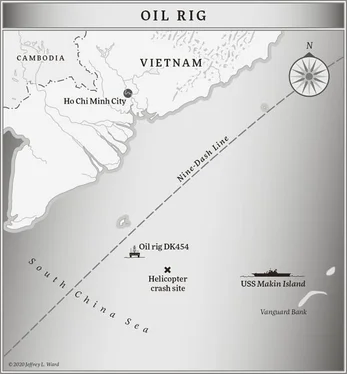A couple of the younger case officers began to squirm at the notion. Hendricks raised a hand and gave a motherly tip of her head. “I know it sounds judgmental and unscientific, but many studies have shown our instinct, our gut, if you will, is correct much of the time. Jeanne Vertefeuille and Sandy Grimes used this very technique at the outset of the hunt for the mole who turned out to be Rick Ames.”
Aldrich “Rick” Ames, a CIA case officer for thirty-one years, was convicted of espionage in 1994. His betrayal of Russian CIA assets cost at least ten lives and brought recruitment of new Russian intelligence assets to a screeching halt for fear that they, too, would inevitably be betrayed and killed.
“Remember,” Hendricks continued. “At this point, we’re not talking about building a case for court. This is simply a move to get us started. I would point out that Ames was high on many people’s list.”
David Wallace’s chair creaked as he rocked backward, subconsciously showing his doubts at the idea.
Admiral Li raised a hand. Hendricks gave him the floor. They’d already rehearsed this.
“In the 1960s,” Li said, “a gifted outside-the-box thinker with Naval Projects named John Craven was assigned to locate a hydrogen bomb that had been lost in the Mediterranean. Amid a crowd of naysayers and cynics, Craven put together a team of mathematicians and engineers, who used something called Bayes’s theorem of subjective probability, an algebraic formula that, to put in simple terms, assigns a numerical value to a gut feeling. Craven’s team took what data they had, and then used Las Vegas–style betting—wagering bottles of whiskey—on where they thought the missing item would be on a grid. Their hunches were basically weaponized with mathematical formulas—the bomb was found, right where the odds said they would be. A short time later, using the same weaponized hunches, he found the USS Scorpion , which had gone missing in the deep Atlantic. The Coast Guard still utilizes this formula in its search-and-recovery missions.”
Li dropped his pen onto the table and glanced at Hendricks before taking his seat.
“Okay,” Hendricks said, resuming her role as both cheerleader and whip. “So listen to your guts. Work independently.” She started to sit down but then added, “After you’re done, please pass your papers to Special Agent Wallace or Admiral Li … You know, in case I’m on your list.”
What Hendricks did not mention was that there were two more members of ELISE, unknown to everyone but her, Wallace, and Foley. Vetted just as thoroughly as the people in the room. Unknown even to each other, these two would continue to work their assigned desks at Langley, reporting back to Hendricks with reactions in the ranks once the cages began to rattle.
Introductions and instructions over, Hendricks picked up her pen and began to compile her own list.
33
CIA case officer Tim Meyer had not started out to commit treason. His goal was to show the Agency where its holes were. To demonstrate how some people with the CIMC were letting things fall through the cracks. At least, that’s what he told himself. What he really wanted was to tank Odette Miller’s career.
In the end, treason had just happened. The money wasn’t bad, though the Chinese didn’t pay nearly as well as he’d heard the Russians did. Fred Rask didn’t know it, but he’d come through with some juicy stuff that might up Meyer’s payday. If he played his cards right, this might be enough to get out, go to some beach somewhere in the South Pacific and just hang.
He’d heard about the mole hunt, of course. Rumors were flying all around Langley. Trusted employees were being dragged in and given polygraphs. The poly didn’t scare Meyer. He’d passed every one he’d taken, and he had plenty of things he didn’t want to disclose. At one point, the examiner had noted a possible deception, but that was just because Meyer was laughing inside. They gave him a retry and he breezed through.
Still, they’d catch him someday. They always figured it out. The trick was knowing when to get out of town. Sooner or later, Meyer knew, someone would snap to the fact that he was selling secrets to Beijing. He’d told his handler just that. Made it clear to her that he wanted to maximize his work so he could minimize his time under the gun. She handled him like a boss, though, and sent him back for more.
Now they were asking questions. Too many questions. Everything was about to change, one way or another.
The function of the CIA’s Counterintelligence Mission Center was to look for attempted penetrations of U.S. intelligence. The CIMC had had a complete makeover in recent years, transforming a duty that was once seen as a career-stopper into a professional and well-run organization. As spy hunters, they were extremely good at their job—but as good as they were, they had yet to catch Tim Meyer.
In their defense, Meyer had been spying for the Chinese for only four months—and he worked counterintelligence.
Meyer was forty-six, with seventeen years under his belt at the Agency. He had a reputation for doing adequate work and not being overzealous about much of anything. Performance appraisals generally showed him average and acceptable, and they couldn’t fire you for being acceptable. Right?
As in any organization, dysfunction had sought out its own, and Meyer had been able to find bosses who were all too happy not to have anyone in their shop make waves. Intelligence operations often took years, and it was no big trick to slack if the planets aligned and two or three people in the chain between boots and management wanted to coast a bit and recharge their batteries after all the life-risking they had to do in the field.
Meyer developed the reputation as a guy who got things done—just in the nick of time. But, hey, he got it done, and that was the important part, right? He got along with most of the guys. He got in trouble once for telling an off-color joke in the breakroom—but that was back when things were just turning to be all woke and politically correct.
You couldn’t even ask a girl from work out anymore. Well, you could, but you had to be extremely careful because your life was pretty much in her hands if you accidentally crossed the line. Meyer had seen it happen. Fortunately for him, he was a quick study, as well as a high-functioning sociopath, and he figured out how to make his intentions appear much more benign than they were. People had a hard time “getting a read” on him. He liked that.
He’d dated an analyst from counterproliferation for a while and she’d tried to describe it. “You’re just so …”
“Enigmatic?” he’d offered.
“No,” she’d said. “That’s not the word …”
But it probably was. And anyway, being unreadable was a good quality at CIA.
Assigned to the Central Asia desk, Meyer’s job was to assist the referent. Referents, the CI officers sent over by the Counterintelligence Mission Center to the various geographical divisions, were sometimes looked at as outsiders, not part of the same team. Meyer’s boss, the baron running Central Asia, wanted to make sure that did not happen on his watch. A mandate came down to cooperate fully with CI, which meant virtually opening the book on every sensitive op so the referent could do his or her job.
In this case, the referent was an officer named Odette Miller. At thirty-two, she’d started with the Agency right out of college and moved up fast—a real blue-flamer. She wasn’t really Meyer’s supervisor, and, when he was honest with himself, she didn’t try to be, but it chapped him that she could waltz in and have the run of the place. He got over it, though, and asked her out for a drink. She’d pretty much told him that he was too old for her. Oh, she was nice about it, on the surface. But he could tell she was laughing at him on the inside. They were what, fourteen years apart? That was nothing. But she laughed like he couldn’t possibly be serious and said he reminded her of her uncle.
Читать дальше











![Александр Ирвин - Tom Clancy’s The Division 2. Фальшивый рассвет [litres]](/books/417744/aleksandr-irvin-tom-clancy-s-the-division-2-falsh-thumb.webp)
